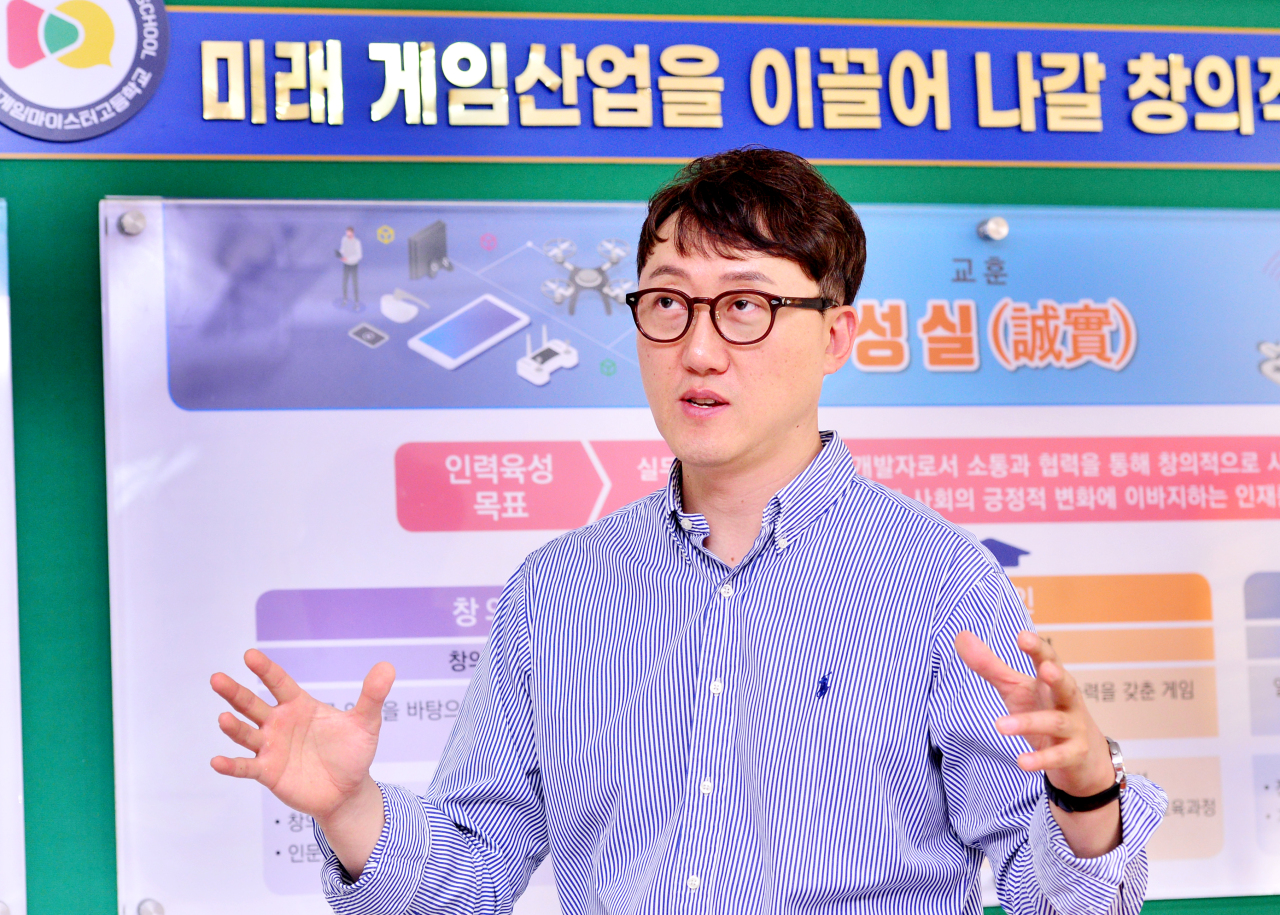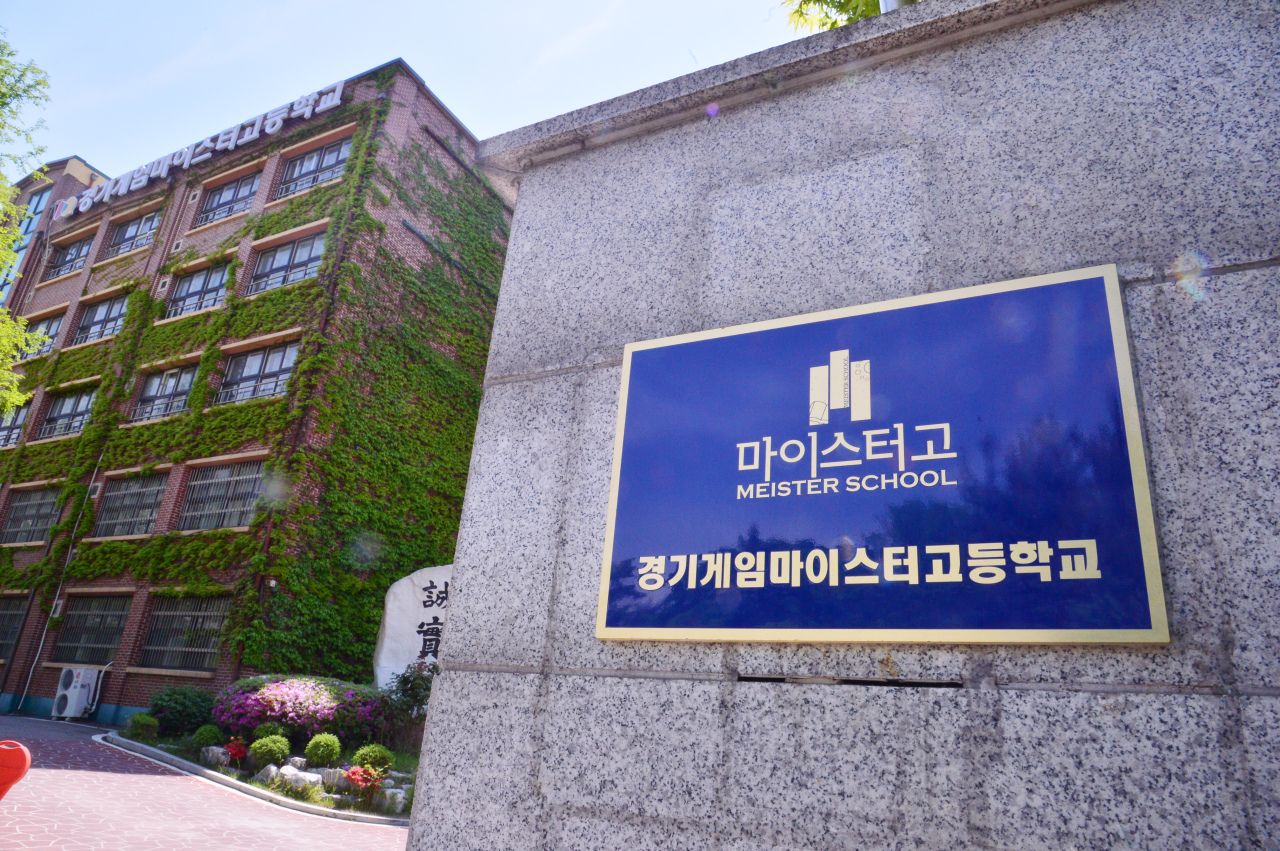 |
Principal Chung Suk-hee poses for a photo at Game Meister High School in Anyang, Gyeonggi Province, May 7. (Park Hyun-koo/The Korea Herald) |
Gyeonggi Game Meister High School in Anyang, Gyeonggi Province, opened March 1, but it was not until April 16 that the school began its academic year. And the school’s inaugural principal, Chung Suk-hee, who is also the head of the Korea Game Developers Association, is still waiting to welcome the school’s first incoming class to the campus as the COVID-19 pandemic has delayed the start of on-site classes.
“Usually principals are chosen from among those who have been teaching for a long time. But the specialty of Game Meister High School, which requires one to work closely with the gaming industry, allowed people with no teaching background to apply,” said Chung in his office May 7, explaining how he was selected for the post.
The Ministry of Culture, Sports and Tourism worked closely with the Korea Creative Content Agency for several years to make the school a reality. Seventy-seven students from around the country were accepted for the first class, with the ratio of applicants to admissions offers reaching 2.5:1 -- relatively high compared with other meister high schools.
Teaching problem-solving skills and nurturing students’ interest in the world are the school’s most important tasks, according to Chung. “I hope this school can be a place where we learn to create meaningful games more so than games for profit and marketing,” said Chung, giving an example of a game based on the lives of independence fighters.
“I want to train the students to think creatively in addition to learning the technical aspects,” said Chung. “I don’t think every developer needs to be creative. But I do believe that creative developers who think outside the box are needed in every project,” he added.
Chung is confident that the students, by the time they graduate, will be able to reach the same level as average college students majoring in gaming. In numerous interviews, Chung has reassured parents that their children will have opportunities to work at big gaming companies.
“I want to go from teaching to coaching the students to make games by their third year. To do so, internships and field experience are needed, and we are planning cooperation with the industry,” said Chung.
 |
Gyeonggi Game Meister High School in Anyang, Gyeonggi Province, is the first of its kind in Korea. (Park Hyun-koo/The Korea Herald) |
To explain the role that the school’s graduates will play in the industry, Chung pointed out some of the problems that the South Korean gaming scene may face in the future. “On the surface, the gaming market in Korea is growing every year. But the game ecosystem is unhealthy in that there are only two extremes, big gaming companies and small ones. Midsized companies need to emerge, and in order to do so, government financial aid as well as a steady influx of talented programmers is needed,” said Chung.
Chung hopes the Gyeonggi Game Meister High School will help fill the latter need.
“I think it’s unlikely that Korea will be back at the front line of the gaming scene in 10, 20 years. Right now, most of the gaming income comes from MMORPG games of 3N companies (Nexon, Netmarble and NC Soft). The users are usually middle-aged and are financially stable,” said Chung.
However, Chung thinks the younger generation is tired of that model, preferring games that are fairer and more egalitarian rather than games where users get better items and stats by spending more money.
Some infuriated players are boycotting Nexon’s Fifa Online 4 and NC Soft’s Lineage 2M because of new updates requiring heavy in-game purchases.
“People accept different starting points in a society much more than in the virtual world. If the difference arises from wealth, the relative deprivation is felt more greatly,” said Chung.
“It’s up in the air whether these players who enjoy an equal playing field will enjoy MMORPG when they are financially well off. If the gaming industry does not change their profit models, lower growth levels can be predicted,” Chung added.
The principal also wanted more government support to make games that can be turned into esports by bringing developers and esports officials together.
PlayerUnknown’s Battlegrounds is one of the few esports games made in Korea.
“For the gaming industry to move forward, we need better policies for the game industry. Right now, the policies say do this or do that, but I think the policies should be more like ‘do anything but this.’ That way, companies have room to express creativity. Also, I think a politician from the gaming industry needs to appear. The Korean gaming industry has been around for 20 years, and someone who knows a lot about this field can help advance it,” said Chung.
By Lim Jang-won (
ljw@heraldcorp.com)






![[Exclusive] Hyundai Mobis eyes closer ties with BYD](http://res.heraldm.com/phpwas/restmb_idxmake.php?idx=644&simg=/content/image/2024/11/25/20241125050044_0.jpg)
![[Herald Review] 'Gangnam B-Side' combines social realism with masterful suspense, performance](http://res.heraldm.com/phpwas/restmb_idxmake.php?idx=644&simg=/content/image/2024/11/25/20241125050072_0.jpg)

